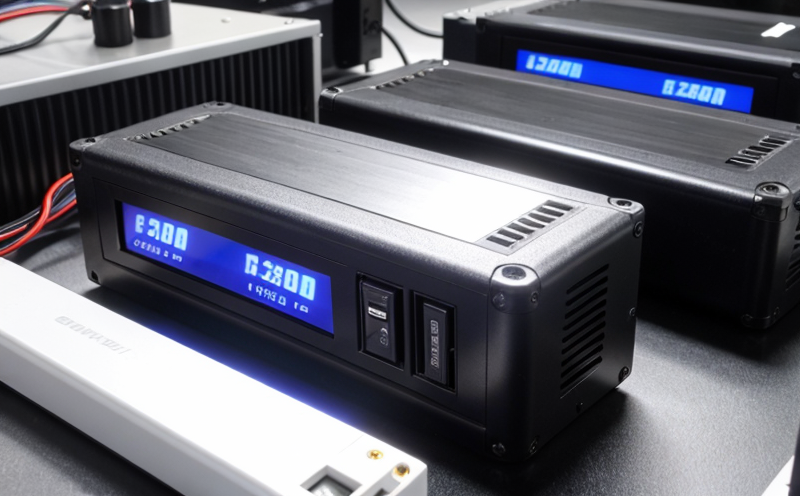SAE J1798 Performance Testing of Electric Vehicle Battery Modules
The SAE J1798 standard provides a comprehensive framework for the performance testing of electric vehicle (EV) battery modules. This standard ensures that EV batteries meet stringent requirements, thereby enhancing safety and reliability in automotive applications.
This service is designed to help quality managers, compliance officers, R&D engineers, and procurement professionals ensure adherence to SAE J1798 standards. By conducting thorough performance tests on battery modules, we aim to provide data-driven insights that support product development and regulatory compliance.
The testing process involves multiple stages aimed at evaluating various parameters critical for EV battery performance. These include charge/discharge cycles, internal resistance measurement, capacity retention, energy efficiency, and temperature cycling under controlled conditions. Each parameter is crucial in determining the overall health and longevity of the battery module.
Our laboratory adheres strictly to SAE J1798 guidelines to ensure accurate and consistent test results. Our state-of-the-art facilities are equipped with advanced instrumentation capable of simulating real-world driving scenarios. This allows us to provide precise measurements that reflect actual performance metrics.
The testing procedure begins with a thorough inspection and characterization of the battery module, followed by initialization calibration using SAE J1798-compliant protocols. During each test cycle, detailed records are maintained on factors such as voltage, current, temperature, and specific energy. Post-testing analysis is conducted to interpret these data points comprehensively.
Our team of experts ensures that every aspect of the testing process aligns with SAE J1798 specifications. We employ rigorous quality control measures throughout to maintain high standards of accuracy and reproducibility. The results are summarized in a detailed report, highlighting key findings and recommendations for improvement or enhancement.
By leveraging SAE J1798, we help our clients achieve robust battery performance that meets both industry expectations and regulatory requirements. Our expertise spans diverse applications within the automotive sector, ensuring that every project benefits from our commitment to excellence.
Applied Standards
The primary standard for this service is SAE J1798: Battery Testing of Electric Vehicle Battery Modules. This document specifies procedures and criteria for testing the performance characteristics of battery modules intended for use in electric vehicles.
In addition to SAE J1798, other relevant standards include ISO 63045-2 ISO 63045-2:2017 and IEC 61486. These international standards provide additional guidelines that complement the SAE J1798 protocol, offering a broader perspective on battery module testing.
The application of these standards ensures consistency across different regions and industries, facilitating seamless integration into global markets. It also supports continuous improvement efforts aimed at enhancing battery technology innovation worldwide.
International Acceptance and Recognition
SAE J1798 has gained widespread acceptance among manufacturers of electric vehicles globally due to its comprehensive approach to evaluating battery modules' performance attributes. Many leading automotive companies have adopted this standard as part of their quality assurance processes.
The recognition extends beyond mere adoption; compliance with SAE J1798 enhances brand reputation and customer trust by demonstrating a commitment to delivering reliable products that meet or exceed expectations set forth internationally. This alignment helps foster innovation while ensuring safety standards are consistently met across borders.
Our laboratory's proficiency in conducting SAE J1798 tests positions us at the forefront of this rapidly evolving field, providing valuable insights into how best practices can be applied globally. Whether you're involved in research and development or production operations, our expertise ensures that your EV battery modules are thoroughly evaluated according to stringent international standards.
Use Cases and Application Examples
| Use Case | Description |
|---|---|
| EV Battery Module Testing | We perform SAE J1798-compliant tests on various types of EV battery modules, including pouch cells and prismatic cells. These tests assess critical parameters like cycle life, energy density, and power delivery. |
| Prototype Evaluation | Our service plays a crucial role in evaluating prototypes early in the development process to identify potential issues before full-scale production begins. This helps minimize costs associated with redesigns later on. |
| R&D Support | For R&D teams, our laboratory offers support throughout the entire product lifecycle—from initial concept through final validation. Our expertise ensures that every stage of development adheres to strict quality control measures. |
| Regulatory Compliance | Battery manufacturers often rely on us to ensure their products comply with relevant regulations and standards, including those specified by SAE J1798. This guarantees safe and efficient operation in diverse environments worldwide. |
| Supplier Quality Assurance | In collaboration with suppliers, we conduct rigorous testing to confirm that they meet agreed-upon specifications for delivering high-quality battery modules on time and within budget constraints. |
| Field Data Collection | Beyond laboratory settings, our team can assist in collecting real-world performance data from deployed EVs. This information is invaluable for refining models and improving future generations of batteries. |
| Packaging Optimization | We also offer services related to optimizing the packaging design around battery modules to ensure optimal performance during transportation and installation. |
These use cases illustrate just how integral SAE J1798 testing is across various stages of EV battery development. By adhering strictly to these standards, we contribute significantly towards advancing the technology while maintaining safety and reliability standards.





